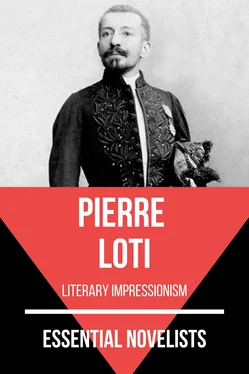“Monsieur Kangourou, who is that young lady over there, in dark blue?”
“Over there, Monsieur? She is called Mademoiselle Chrysantheme. She came with the others you see here; she is only here as a spectator. She pleases you?” said he, with eager suddenness, espying a way out of his difficulty. Then, forgetting all his politeness, all his ceremoniousness, all his Japanesery, he takes her by the hand, forces her to rise, to stand in the dying daylight, to let herself be seen. And she, who has followed our eyes and begins to guess what is on foot, lowers her head in confusion, with a more decided but more charming pout, and tries to step back, half-sulky, half-smiling.
“It makes no difference,” continues M. Kangourou, “it can be arranged just as well with this one; she is not married either, Monsieur!”
She is not married! Then why didn’t the idiot propose her to me at once instead of the other, for whom I have a feeling of the greatest pity, poor little soul, with her pearl-gray dress, her sprig of flowers, her now sad and mortified expression, and her eyes which twinkle like those of a child about to cry.
“It can be arranged, Monsieur!” repeats Kangourou again, who at this moment appears to me a go-between of the lowest type, a rascal of the meanest kind.
Only, he adds, we, Yves and I, are in the way during the negotiations. And, while Mademoiselle Chrysantheme remains with her eyelids lowered, as befits the occasion, while the various families, on whose countenances may be read every degree of astonishment, every phase of expectation, remain seated in a circle on my white mats, he sends us two into the veranda, and we gaze down into the depths below us, upon a misty and vague Nagasaki, a Nagasaki melting into a blue haze of darkness.
Then ensue long discourses in Japanese, arguments without end. M. Kangourou, who is laundryman and low scamp in French only, has returned for these discussions to the long formulas of his country. From time to time I express impatience, I ask this worthy creature, whom I am less and less able to consider in a serious light:
“Come now, tell us frankly, Kangourou, are we any nearer coming to some arrangement? Is all this ever going to end?”
“In a moment, Monsieur, in a moment;” and he resumes his air of political economist seriously debating social problems.
Well, one must submit to the slowness of this people. And, while the darkness falls like a veil over the Japanese town, I have leisure to reflect, with as much melancholy as I please, upon the bargain that is being concluded behind me.
Night has closed in; it has been necessary to light the lamps.
It is ten o’clock when all is finally settled, and M. Kangourou comes to tell me:
“All is arranged, Monsieur: her parents will give her up for twenty dollars a month—the same price as Mademoiselle Jasmin.”
On hearing this, I am possessed suddenly with extreme vexation that I should have made up my mind so quickly to link myself in ever so fleeting and transient a manner with this little creature, and dwell with her in this isolated house.
We return to the room; she is the centre of the circle and seated; and they have placed the aigrette of flowers in her hair. There is actually some expression in her glance, and I am almost persuaded that she—this one—thinks.
Yves is astonished at her modest attitude, at her little timid airs of a young girl on the verge of matrimony; he had imagined nothing like it in such a connection as this, nor I either, I must confess.
“She is really very pretty, brother,” said he; “very pretty, take my word for it!”
These good folks, their customs, this scene, strike him dumb with astonishment; he can not get over it, and remains in a maze. “Oh! this is too much,” he says, and the idea of writing a long letter to his wife at Toulven, describing it all, diverts him greatly.
Chrysantheme and I join hands. Yves, too, advances and touches the dainty little paw. After all, if I wed her, it is chiefly his fault; I never should have remarked her without his observation that she was pretty. Who can tell how this strange arrangement will turn out? Is it a woman or a doll? Well, time will show.
The families, having lighted their many-colored lanterns swinging at the ends of slight sticks, prepare to retire with many compliments, bows, and curtseys. When it is a question of descending the stairs, no one is willing to go first, and at a given moment, the whole party are again on all fours, motionless and murmuring polite phrases in undertones.
“Haul back there!” said Yves, laughing, and employing a nautical term used when there is a stoppage of any kind.
At length they all melt away, descending the stairs with a last buzzing accompaniment of civilities and polite phrases finished from one step to another in voices which gradually die away. He and I remain alone in the unfriendly, empty apartment, where the mats are still littered with the little cups of tea, the absurd little pipes, and the miniature trays.
“Let us watch them go away!” said Yves, leaning out. At the door of the garden is a renewal of the same salutations and curtseys, and then the two groups of women separate, their bedaubed paper lanterns fade away trembling in the distance, balanced at the extremity of flexible canes which they hold in their fingertips as one would hold a fishing-rod in the dark to catch night-birds. The procession of the unfortunate Mademoiselle Jasmin mounts upward toward the mountain, while that of Mademoiselle Chrysantheme winds downward by a narrow old street, half-stairway, half-goat-path, which leads to the town.
Then we also depart. The night is fresh, silent, exquisite, the eternal song of the cicalas fills the air. We can still see the red lanterns of my new family, dwindling away in the distance, as they descend and gradually become lost in that yawning abyss, at the bottom of which lies Nagasaki.
Our way, too, lies downward, but on an opposite slope by steep paths leading to the sea.
And when I find myself once more on board, when the scene enacted on the hill above recurs to my mind, it seems to me that my betrothal is a joke, and my new family a set of puppets.
CHAPTER V. A FANTASTIC MARRIAGE
JULY 10, 1885.
––––––––
THREE DAYS HAVE PASSED since my marriage was an accomplished fact.
In the lower part of the town, in one of the new cosmopolitan districts, in an ugly, pretentious building, which is a sort of registry office, the deed was signed and countersigned, with marvellous hieroglyphics, in a large book, in the presence of those absurd little creatures, formerly silken-robed Samurai, but now called policemen, dressed up in tight jackets and Russian caps.
The ceremony took place in the full heat of midday; Chrysantheme and her mother arrived together, and I alone. We seemed to have met for the purpose of ratifying some discreditable contract, and the two women trembled in the presence of these ugly little men, who, in their eyes, were the personification of the law.
In the middle of their official scrawl, they made me write in French my name, Christian name, and profession. Then they gave me an extraordinary document on a sheet of rice-paper, which set forth the permission granted me by the civilian authorities of the island of Kiu-Siu, to inhabit a house situated in the suburb of Diou-djen-dji, with a person called Chrysantheme, the said permission being under the protection of the police during the whole of my stay in Japan.
In the evening, however, in our own quarter, our little marriage became a very pretty affair—a procession carrying lanterns, a festive tea and some music. All this seemed quite necessary.
Now we are almost an old married couple, and we are gently settling down into everyday habits.
Читать дальше












